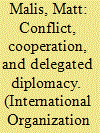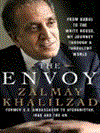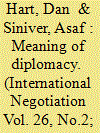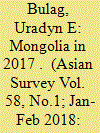| Srl | Item |
| 1 |
ID:
095949


|
|
|
| 2 |
ID:
181668


|
|
|
|
|
| Summary/Abstract |
Does diplomacy affect the prospects of international conflict and cooperation? Systematic empirical assessment has been hindered by the inferential challenges of separating diplomacy from the distribution of power and interests that underlies its conduct. This paper addresses the question of diplomacy's efficacy by examining the intragovernmental politics of US foreign policy, and the varying influence of diplomatic personnel in the policy process. I claim that diplomats hold the strongest preferences for cooperative relations with their host countries, relative to other participants in the foreign policy process. They also exert substantial influence over the formation and implementation of US policies toward their host countries but their influence is intermittently weakened by the short-term shock of an ambassadorial turnover. As a result, when ambassadors are removed from post, diplomacy is more likely to be eschewed for more conflictual means of settling international disagreements, and opportunities for economic exchange are less likely to be realized. I test this theory using newly collected data on US diplomatic representation, for the global sample of countries from 1960 through 2014. To address concerns of diplomatic staffing being endogenous to political interests, I leverage a natural experiment arising from the State Department's three-year ambassadorial rotation system. The turnover of a US ambassador causes a decrease in US exports to the country experiencing the turnover, and heightens the risk of onset of a militarized dispute between that country and the US. These findings point to bureaucratic delegation as an important but overlooked determinant of macro-level international outcomes.
|
|
|
|
|
|
|
|
|
|
|
|
|
|
|
|
| 3 |
ID:
144675


|
|
|
|
|
| Publication |
New York, St. Martin's press, 2016.
|
| Description |
332p.hbk
|
| Standard Number |
9781250083005
|
|
|
|
|
|
|
|
|
|
|
|
Copies: C:1/I:0,R:0,Q:0
Circulation
| Accession# | Call# | Current Location | Status | Policy | Location |
| 058646 | 327.2092/KHA 058646 | Main | On Shelf | General | |
|
|
|
|
| 4 |
ID:
123698


|
|
|
|
|
| Publication |
2013.
|
| Summary/Abstract |
Model United Nations (MUN) is a simulation in which students take on the roles of ambassadors to the United Nations, engaging in debate on 'real' issues from the perspective of their assumed national identities. This paper, based on a year of ethnography and interviews of a college-level MUN team, examines the role of humour in producing particular geopolitical imaginations among those participating and also in producing the MUN assemblage itself. Key here is the circulation of affects among participants' bodies, producing an orientation among them that facilitates debate and consensus-building. This finding is seen as a corrective to past work on geopolitics and humour, which has tended to emphasise irony and satire, as well as mass-mediated humor.
|
|
|
|
|
|
|
|
|
|
|
|
|
|
|
|
| 5 |
ID:
178451


|
|
|
|
|
| Summary/Abstract |
This article draws on interviews with 198 state ambassadors and applies an interpretivist lens to provide a more nuanced conceptualization of diplomacy. In doing so, we seek to project a closer fit between scholarly definitions of the term and how diplomacy is understood by practitioners. We contribute to the literature by proposing a more refined understanding of the term, presented here as five distinct (though not mutually exclusive) ‘meanings’ of diplomacy: (1) The actors taking part in modern diplomacy; (2) the objectives of diplomacy; (3) the mechanisms of diplomacy; (4) diplomacy as a skill; and (5) diplomacy as a profession. We find that drawing on the full range of the diplomatic experience is particularly important given the growing challenges to negotiation as the primary agency of diplomacy.
|
|
|
|
|
|
|
|
|
|
|
|
|
|
|
|
| 6 |
ID:
160390


|
|
|
|
|
| Summary/Abstract |
In 2017 Mongolians elected a populist president who is more assertive than his predecessors amid initial uncertainties introduced by a $5.5 billion IMF bailout package. The country continued to be embroiled in a fight over the fate of the 49% private holdings in the Erdenet enterprise. There were signs that Mongolia was becoming less active in engaging its third neighbors.
|
|
|
|
|
|
|
|
|
|
|
|
|
|
|
|